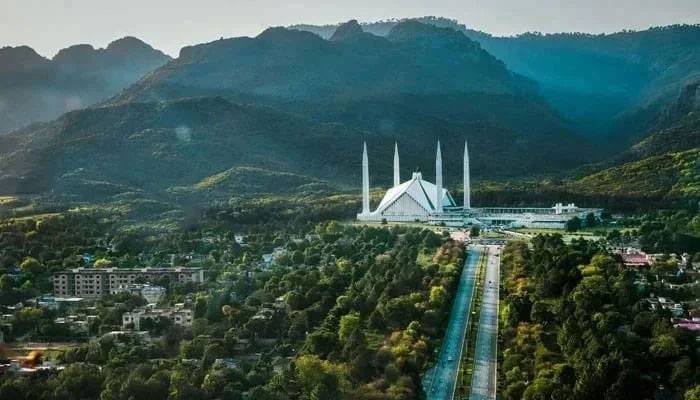Unplanned urban growth
Over past two decades, rapid and often chaotic development has increasingly defined Islamabad's landscape
Islamabad, once hailed as a model of urban planning, is now struggling under the weight of its expansion. What was envisioned as a serene, green, and orderly capital has succumbed to unplanned urban sprawl, fueled by unchecked housing societies, overstretched resources, and the apparent lack of proactive supervision by the Capital Development Authority (CDA).
Over the past two decades, rapid and often chaotic development has increasingly defined Islamabad's landscape. Islamabad's metro area population has been steadily growing over the years. In 2023, it reached 1,232,000, marking a 2.84 per cent increase from 2022. The previous year, 2022, saw a population of 1,198,000, which was a 2.92 per cent rise from 2021. Back in 2021, the population stood at 1,164,000, reflecting a 3.1 per cent growth from 2020.
The proliferation of housing societies – some legal, many unauthorised – has led to a haphazard urban fabric that neither reflects the city’s original master plan nor meets the needs of its growing population. What remains visible today is an alarming mismatch between demand and civic agency performance.
The rising population and accompanying construction boom have put tremendous pressure on Islamabad’s fragile infrastructure. Water shortages, for instance, have become a recurring crisis. Despite being surrounded by reservoirs, the city’s groundwater levels have dropped significantly due to excessive extraction and poor water management.
While the CDA acknowledges the issue, its response remains reactive rather than forward-looking. Meanwhile, new housing projects add to the demand without presenting sustainable water solutions, leaving residents to fend for themselves. The water tanker mafia, supplying water for exorbitant prices, thrives amidst this shortage, adding to the financial burden on residents.
The energy situation paints a similar picture. Islamabad’s power infrastructure was designed for a limited population, but the unchecked growth of housing societies has created an unsustainable load on the grid. Residents in newer areas experience frequent outages, and no significant planning is visible to integrate renewable or alternative energy solutions into Islamabad’s development strategy.
Equally troubling is the environmental cost. Islamabad’s green cover, once its pride, is rapidly shrinking as trees are felled to make way for concrete developments. Housing societies have turned open spaces into poorly planned plots with little regard for parks, drainage, or public amenities. This environmental degradation threatens the city’s aesthetic charm and exacerbates its vulnerability to climate change.
The CDA, entrusted with maintaining Islamabad’s urban integrity, has struggled to fulfill its role as a vigilant regulator. While there are mechanisms to approve and monitor housing projects, enforcement remains weak. Unauthorised societies continue to thrive, often operating with impunity due to loopholes and delayed action. The result is a city where rules exist on paper but seldom translate into practice.
The absence of a coherent structure also creates socio-economic divides. The influx of new residents, combined with unplanned growth, has strained the city’s healthcare, education, and transport services. Public facilities are often concentrated in central areas, leaving suburban residents underserved and disconnected. Meanwhile, developers of private housing schemes prioritise profits over public welfare, offering bare minimum facilities while neglecting long-term sustainability.
Adding to the already strained urban landscape, the situation in Khyber Pakhtunkhwa (KP) is putting additional pressure on Islamabad. The region, plagued by insurgency, military operations, and a lack of economic opportunities, has seen a large influx of internally displaced persons (IDPs). These families are fleeing violence, insecurity, and economic stagnation in KP, seeking refuge in Islamabad and its surrounding areas. The rapid migration, driven by the desire for better safety and livelihood, has compounded the strain on Islamabad’s infrastructure, leading to further unregulated urban sprawl.
The lack of opportunities in KP has made Islamabad an attractive destination for those hoping for a fresh start. As a result, the demand for housing has surged, prompting developers to establish new housing schemes – many of which bypass regulatory scrutiny. These areas are experiencing unchecked growth, contributing to the city’s rapid and chaotic expansion. The result is a city increasingly losing its sense of order, with poor infrastructure and a lack of civic agency oversight.
Islamabad urgently needs a revised urban strategy that balances growth with sustainability. The CDA must assert its role as an active regulator and ensure strict oversight of housing societies. A city as critical as the capital cannot afford to grow without a plan. Housing schemes must adhere to environmental and infrastructure standards, with a clear focus on water conservation, energy efficiency, and green spaces.
Moreover, Islamabad must prioritize the development of public services and connectivity infrastructure to match its population growth. Investing in public transport, alternative energy, and water management systems will not only ease the burden on the city but also set an example for planned urban growth.
It is time to restore Islamabad’s identity as a city of order, nature, and opportunity. Between 2001 and 2023, Islamabad lost 13 hectares of tree cover. This amounts to a 0.42 per cent reduction in tree cover since 2000, leading to 5.20 kilotons of carbon dioxide emissions. Unplanned urban sprawl is eroding its foundation, and without urgent action, the capital risks becoming a cautionary tale of mismanaged growth.
CDA, policymakers, and citizens must come together to ensure that Islamabad does not lose its original promise – a planned, livable, and sustainable city.
The writer is a freelance journalist based in Islamabad. He tweets/posts @fezi22 and can be reached at: fparacha@gmail.com
-
 Actor Awards 2026 Winners: Complete List
Actor Awards 2026 Winners: Complete List -
 UK Asylum System Faces Changes As Refugees Will Get Temporary Protection Only
UK Asylum System Faces Changes As Refugees Will Get Temporary Protection Only -
 Meghan Markle Has Realised ‘star Power’ Is Not Enough After Jordan Trip
Meghan Markle Has Realised ‘star Power’ Is Not Enough After Jordan Trip -
 USC Leading Scorer Chad Baker-Mazara Leaves Program Amid Losing Streak
USC Leading Scorer Chad Baker-Mazara Leaves Program Amid Losing Streak -
 Google Is Winding Down Popular App 'Pixel Studio': Here's Why
Google Is Winding Down Popular App 'Pixel Studio': Here's Why -
 Zendaya, Tom Holland Secretly Married?
Zendaya, Tom Holland Secretly Married? -
 Dove Cameron Reveals Why She's Limiting Relationship Talk After Damiano David Engagement
Dove Cameron Reveals Why She's Limiting Relationship Talk After Damiano David Engagement -
 Bulls Vs Bucks: Giannis Out, Simons And Williams Sidelined
Bulls Vs Bucks: Giannis Out, Simons And Williams Sidelined -
 Princess Beatrice Is ‘haunted’ By Dreadful Shamed Andrew Arrest
Princess Beatrice Is ‘haunted’ By Dreadful Shamed Andrew Arrest -
 Panthers Vs Islanders: Dmitry Kulikov Returns From Injured Reserve As Schwindt Hits IR
Panthers Vs Islanders: Dmitry Kulikov Returns From Injured Reserve As Schwindt Hits IR -
 SAG-AFTRA Drops SAG Awards Name To Rebrand
SAG-AFTRA Drops SAG Awards Name To Rebrand -
 Next Full Moon: How To Watch The Total Lunar Eclipse On March 3
Next Full Moon: How To Watch The Total Lunar Eclipse On March 3 -
 Bhad Bhabie Shares Tender Moment With Daughter Amid Cancer Setback Hint
Bhad Bhabie Shares Tender Moment With Daughter Amid Cancer Setback Hint -
 Silver, Gold Prices Surge Amid Geopolitical Uncertainty After US-Israel Attack On Iran
Silver, Gold Prices Surge Amid Geopolitical Uncertainty After US-Israel Attack On Iran -
 Britain To Trial Social Media Ban For Hundreds Of Thousands Of Children Under-16
Britain To Trial Social Media Ban For Hundreds Of Thousands Of Children Under-16 -
 Prince Harry Should Face Same Fate As Shamed Andrew, Says Expert
Prince Harry Should Face Same Fate As Shamed Andrew, Says Expert




